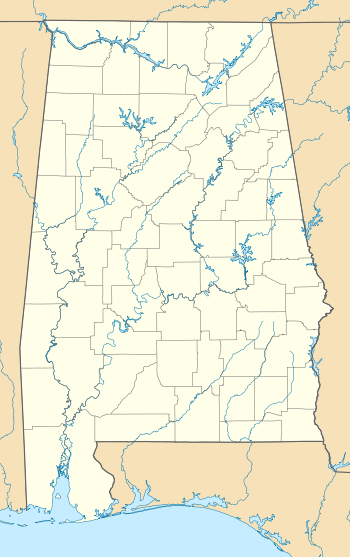Hollywood, Homewood, Alabama
|
Hollywood Historic District | |
|
| |
 | |
| Location | Roughly bounded by Al 31, AL 280 and Lakeshore Dr., Homewood, Alabama |
|---|---|
| Coordinates | 33°28′47″N 86°46′54″W / 33.47972°N 86.78167°WCoordinates: 33°28′47″N 86°46′54″W / 33.47972°N 86.78167°W |
| Area | 815 acres (330 ha) |
| Architect | multiple |
| Architectural style | Mission/Spanish Revival, Tudor Revival, et al. |
| Governing body | Local |
| NRHP Reference # | 02000482[1] |
| Added to NRHP | May 16, 2002 |
Hollywood is a former town annexed into Homewood, Alabama, in 1929. A historic district of much of the area is listed on the National Register of Historic Places as Hollywood Historic District. The district is roughly bounded by U.S. Highway 31, U.S. Highway 280, and Lakeshore Drive and is significant for the Mission Revival and Spanish Colonial Revival architectural style of surviving houses and other buildings.[2]
History
Clyde Nelson began developing Hollywood Boulevard as a residential subdivision in 1926. He employed a sales force of 75, armed with the memorable slogan "Out of the Smoke Zone, Into the Ozone", to entice Birmingham residents over Red Mountain. Architect George P. Turner designed many of the new homes in the Spanish Colonial Revival architecture, which had become fashionably linked with the glamour of Hollywood, California in the early days of the motion picture industry there. Turner also nodded to the English Tudor style which was already widespread in Birmingham and over the mountain.
The Hollywood Country Club on Lakeshore Drive (destroyed in 1984 by fire) and the American Legion Post 134 (originally Hollywood's Town Hall) were also built at this time.
In order to support his new development, Nelson created the area's first autobus line and extended the first natural gas pipeline into Shades Valley.
Hollywood incorporated as a town on January 14, 1927 with Clarence Lloyd as its first and only mayor. The town was annexed into Homewood on October 14, 1929. The Great Depression virtually ended development of the subdivision.
In 2002, the Hollywood Historic District was registered with the National Register of Historic Places, and is home to The American Institute of Architects (AIA)-nominated houses like 11 Bonita Street. The listing includes 412 contributing buildings and one contributing site, over a 815 acres (330 ha) area.[1]
References
- ↑ 1.0 1.1 "National Register Information System". National Register of Historic Places. National Park Service. 2009-03-13.
- ↑ King, Pamela Sterne; Christy Anderson (September 1, 2001). "Hollywood Historic District" (PDF). National Register of Historic Places Registration Form. National Park Service. Archived from the original on March 17, 2014. Retrieved March 17, 2014. See also: "Accompanying photos" (PDF). Archived from the original on March 17, 2014. Retrieved March 17, 2014.
- Baggett, James L. (April 2004) "Homewood: The Life of a City." Alabama Review.
| |||||||||||||||||||||

